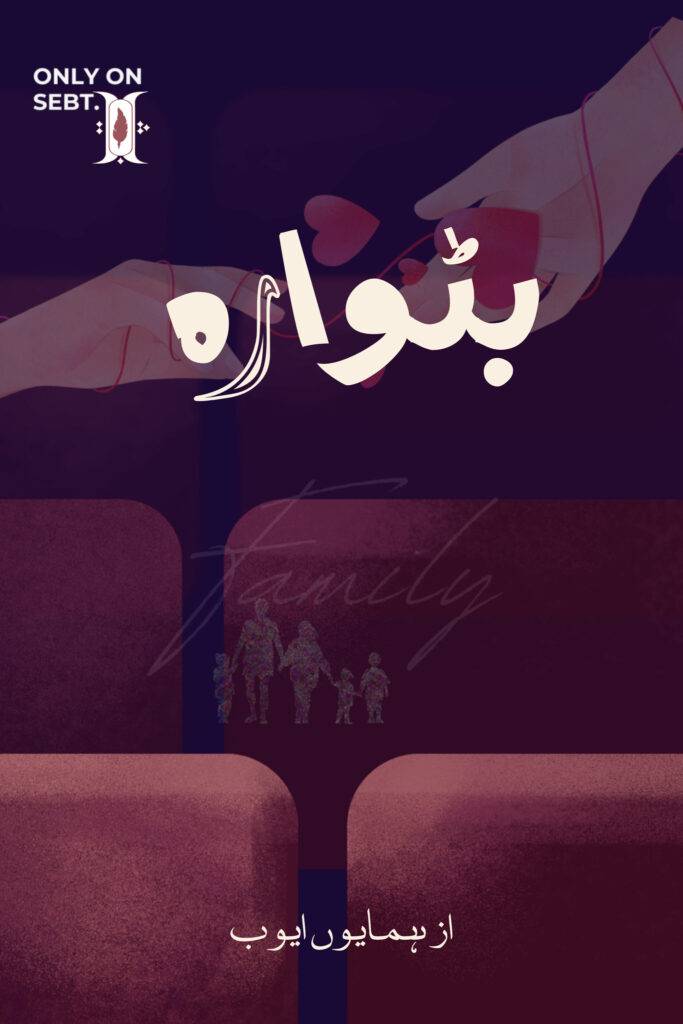بٹوارہ! نام سے ہی آپ پرکھ گئے ہوں گے کہ یہ ایک ایسے خاندان کی کہانی ہونے والی ہے، جن کے بیچ بٹوارہ ہو چکا ہوگا، نفرتیں ہوں گیں، لڑنے مرنے کیلئےسب تیار ہوں گے مگر…پھر مصنف اس میں ایک پیار کی کہانی کو جنم دے گا، بتائے گا کہ بٹوارہ ضرور ہے مگر یہیں دو دل ایسے بھی ہیں جن کو کوئی دیوار، کوئی نفرت جدا نہیں کر پاتی۔ پھر مصنف اس کہانی کو لازوال تب کرے گا جب وہ دو دل کسی حادثے کا شکار ہو جائیں گے اور پیچھے تمام لوگ پچھتاوے میں اس بٹوارے کو ہمیشہ کیلئے ختم کر دیں گے، اور کہانی ختم… مگر ادھر کوئی ایسا سین نہیں ہے۔ یہ کوئی محبت کی کہانی نہیں۔ یہ کوئی خاندانوں کی صدیوں سے چلی آ رہی لڑائیوں کی کہانی نہیں۔ پھر کیا ہے یہ؟ یہ ایک سنجیدہ موضوع پہ لکھی ایک بہت ہی غیر سنجیدہ کہانی ہے۔
From the title Batwara (Partition), you might think you already know the story. A large joint family, years of suppressed grievances, property feuds, fiery courtroom scenes, and siblings ready to draw swords over inherited land. You’re probably expecting a romance-based Urdu novel, complete with two star-crossed lovers from opposite sides of the family, fighting for love amidst ancestral hatred — a classic enemies to lovers setup, ending in heartbreak or union after tragedy.
Sounds familiar, right?
Well, that’s not what Batwara is.
This novel is not a romantic suspense saga. It’s not about a timeless love story born during a generational feud. It’s not about an army-based hero coming back to his divided home. It’s not a fairy tale love story with a bitter ending. And it’s definitely not about centuries-old family honor wars.
Instead, Batwara is a deadly serious story… told with complete unseriousness.
Written in a refreshingly bold and fearless voice, Batwara is a social commentary-based Urdu novel that dares to question everything — family, identity, politics, fake righteousness, and even our obsession with drama-filled fiction. It’s a novel that toys with clichés only to expose them. It sets up tropes and then knocks them down, leaving behind truth, sarcasm, and reflection.
This book is for those who love:
Social commentary-based Urdu novels
Satirical Urdu fiction
Novels about dysfunctional families
Psychological fiction with wit
Meta storytelling
Dark humor in Urdu literature
Unexpected twists in family-based fiction
Non-romantic central plots
Urdu novels that challenge tradition
Character-driven instead of romance-driven stories
Critiques of joint family systems
Emotionally layered fiction with satire
Novels with social awareness but light tone
That’s the question Batwara keeps asking.
There’s no self-sacrificing heroine. No dashing romantic suspense hero in uniform. No enemies-to-lovers twist waiting to soften you. No soulmates caught in an age-old feud. No damsel in distress waiting for a fairy tale ending. Just real, complicated, often absurd people — trying to divide everything: homes, hearts, relationships, and even pain.
And somewhere in this unromantic, unsentimental, and unapologetically realistic novel, you’ll find moments of truth far more profound than what traditional romance-based Urdu novels often promise.
In an era where every second Urdu novel claims to be a romantic thriller, fairy tale love story, or army-based romance, Batwara chooses to laugh at all of it — while pulling back the curtain on what truly matters. This is a novel that pokes fun at our societal obsessions while also delivering gut-punch honesty about human nature, hypocrisy, and regret.
Yet despite its humor and casual tone, it leaves a deep impression — not with tears, but with uncomfortable truths. It’s a story of everything we try to divide, and a sharp reminder of everything that shouldn’t be divided in the first place.
Predictable romance-based plots
Repetitive army-based male leads
Dragged-out family feud sagas
Overly dramatic enemies to lovers arcs
Forced happy endings
Shallow romantic suspense stories
Batwara is for the bold reader. The one who’s not afraid to be surprised. The one who wants social commentary without the lecture, humor without the cringe, and truth without the syrupy filter of romance.
This isn’t your typical Urdu novel.
This is Batwara — a partition of expectations, and a union of reality.

